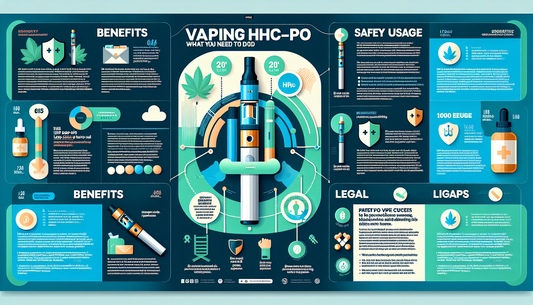HHC - General Questions
HHC - A Synthetic or Natural Cannabinoid?
HHC, known as hexahydrocannabinol, is the first semi-synthetic cannabinoid identified in the European Union, monitored by the EU's early warning system since October 21, 2022. Unlike typical synthetic cannabinoids such as those in Spice products, HHC can be produced from CBD extracted from low-THC cannabis strains.
Safety of HHC Consumption
Compared to THC, HHC, which is a hydrogenated variant of THC, appears to have similar effects and comparable potency, persisting longer in the body. Future studies are expected to validate HHC's safety at levels similar to THC.
Use of HHC in Vaping
Popular among vaping options, HHC offers effects similar to Delta-8 and Delta-9 THC and is available in various forms, including edibles and oils, for a tailored consumer experience.
Classification of HHC - Indica or Sativa?
HHC effects tend to align more with Sativa THC variants, emphasizing energy and user focus.
Diversity of HHC Products
There are different types of HHC, such as 9R-HHC, which is more potent, and S9-HHC, which is less effective. The product's efficiency depends on the ratio between these variants.
Aroma of HHC Products
HHC products do not have a distinct smell of their own; the perceived aroma comes from natural or synthetic flavor additives used in vape solutions or other products.
Nature and Technology - HHC Production
At E-Euphoria, HHC is obtained by modifying CBD extracted from hemp, processed into a pure powder form, and then converted into HHC under controlled conditions.
Safety Aspects of HHC
Currently, there are no conclusive studies indicating potential risks of toxicity, neurotoxicity, or carcinogenicity associated with HHC.
Innovation in Cannabinoids - Creating HHC
HHC was first synthesized by American chemist Roger Adams in 1944 by adding hydrogen to the Delta-9 THC molecule, a process called hydrogenation, thus transforming it into hexahydrocannabinol.
Blog posts
View all-

HHC-PO in the UK: Legal Insights & Surprising F...
Have you ever found yourself wondering about the legal status of emerging cannabinoids in the United Kingdom? With the cannabis industry rapidly evolving, it's crucial to stay informed about the...
HHC-PO in the UK: Legal Insights & Surprising F...
Have you ever found yourself wondering about the legal status of emerging cannabinoids in the United Kingdom? With the cannabis industry rapidly evolving, it's crucial to stay informed about the...
-

Maximize Your Vaping: Choose the Best HHC-PO Ca...
Imagine standing in front of a vast selection of HHC-PO cartridges, each promising an unparalleled experience. The variety is overwhelming, and the decision is yours to make. But how do...
Maximize Your Vaping: Choose the Best HHC-PO Ca...
Imagine standing in front of a vast selection of HHC-PO cartridges, each promising an unparalleled experience. The variety is overwhelming, and the decision is yours to make. But how do...
-

HHC-PO Vaping: Uncover Your Next Euphoric Journey
Vaping HHC-PO: What You Need to Know Introduction Are you intrigued by the evolving landscape of vaping cannabinoids? With the rapid advancements in cannabis research and product development, a new...
HHC-PO Vaping: Uncover Your Next Euphoric Journey
Vaping HHC-PO: What You Need to Know Introduction Are you intrigued by the evolving landscape of vaping cannabinoids? With the rapid advancements in cannabis research and product development, a new...



